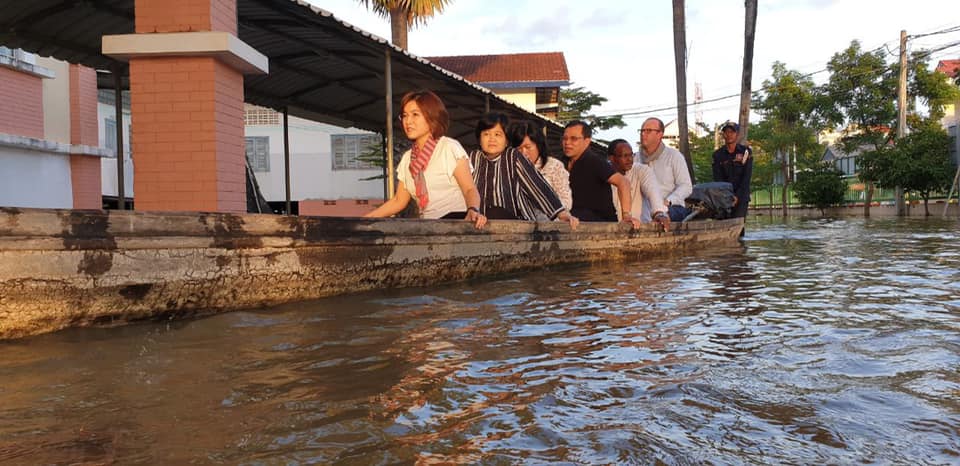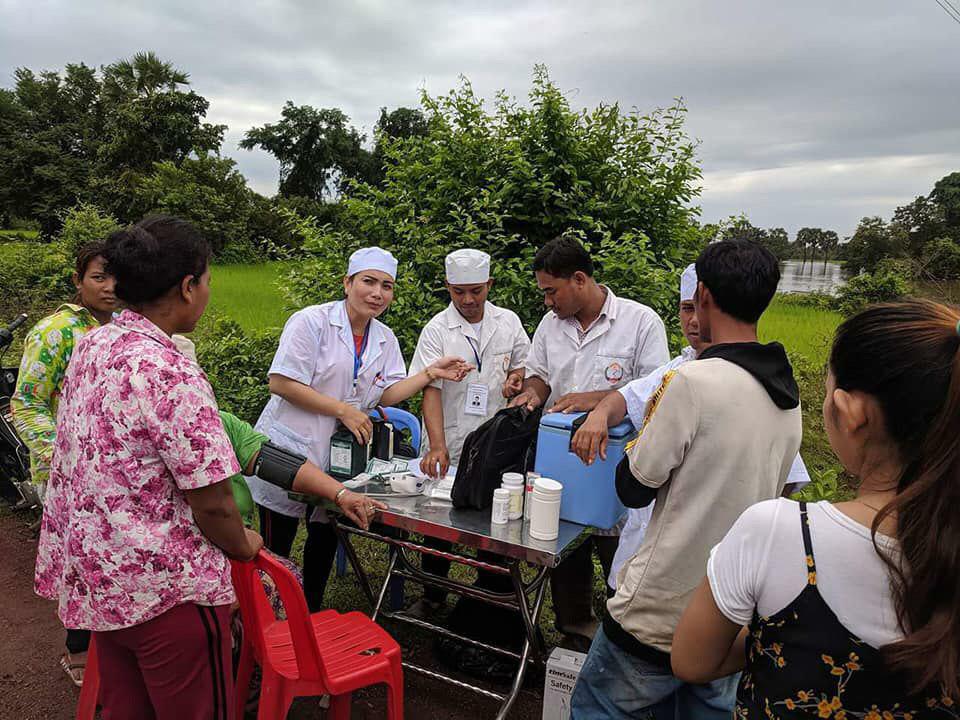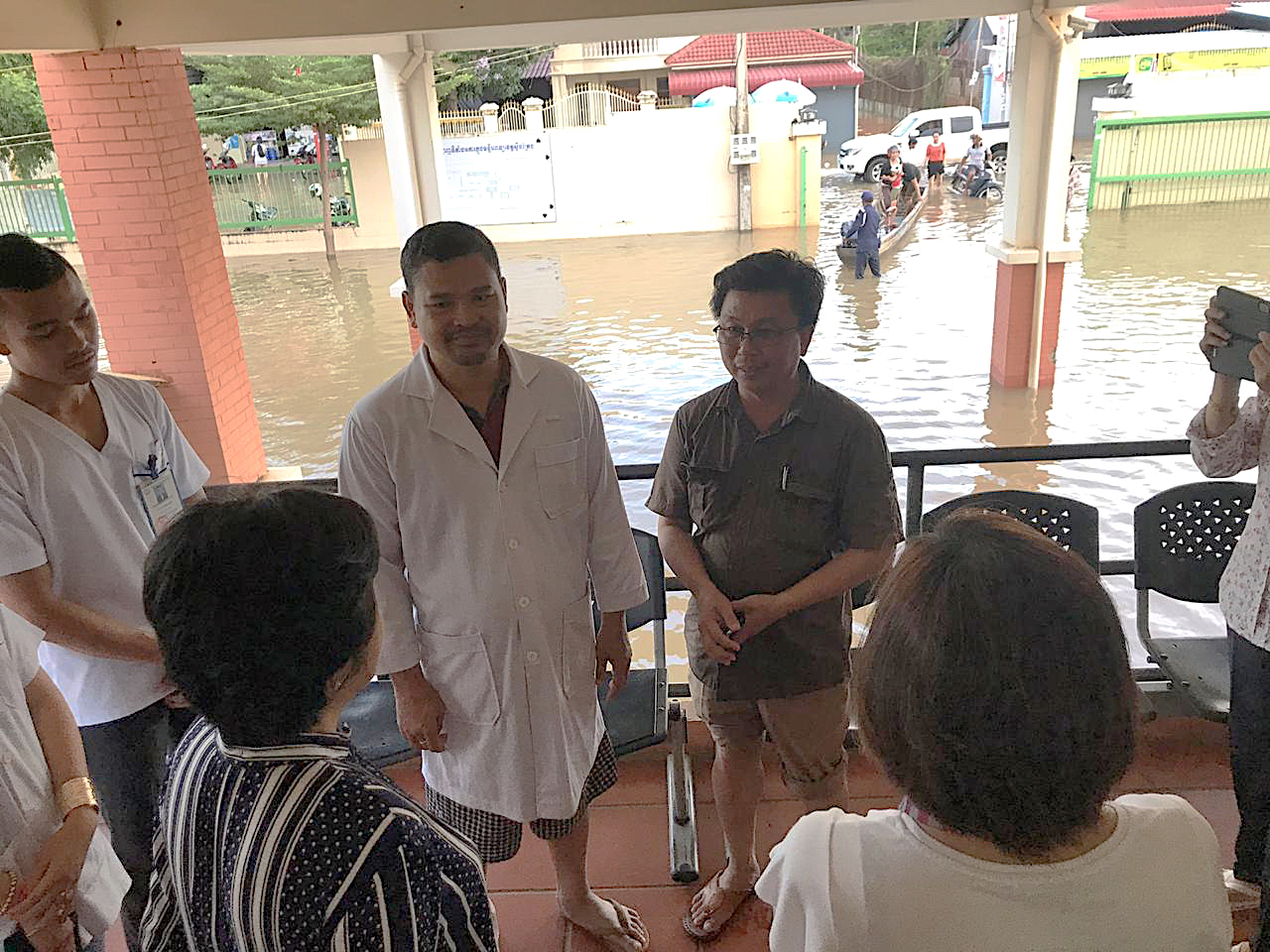Seasonal flooding poses a serious threat to Cambodians. Cambodia’s Ministry of Health, with support from the World Health Organization, is working to meet the urgent health needs of flood-affected populations. With a view to mitigating the impact of floods in the future, MOH is establishing preparedness measures before the onset of a flood.
In the aftermath of Tropical Storm Podul and Tropical Depression Kajiki’s passage, in the recent weeks of the 2019 rainy season, 34 health centres were flooded in Stung Treng, Kratie, Tbong Khmum, Kampong Cham, Prey Veng and Siem Reap provinces. At the onset of the floods, WHO accompanied the Minister of Health H.E Dr Mam Bunheng when he visited some of the affected provinces.
To date, according to the National Committee for Disaster Management, 93,319 households have been affected and 11,579 households displaced in 10 provinces, with the floods claiming 16 deaths, including seven children.

During a flood, providing effective health services, both routine and emergency response, can be challenging with referral hospitals and health centres in the provinces inundated with water. This disrupts normal activities with people encountering difficulties travelling to them through floodwater. Referral hospitals may also experience an increased influx of patients; this may include patients that require particular specialized care.
Health centres in the flood-affected provinces, however, have proven to be resilient. They have overcome logistical and operational challenges by relocating to evacuation sites and safer areas away from flood zones. Health workers have used boats to provide outreach services to the poorest and most vulnerable, running mobile clinics.

Working closely with the Ministry of Health, WHO has provided technical and operational support to the Provincial Health Departments for essential health services to the flood-affected areas as well as enhancing surveillance and outbreak detection and risk communication activities. The Ministry of Health, with support from WHO, rolled out refresher training courses for surveillance officers in Stung Treng, Kratie, Kampong Cham and Tbong Khmum provinces in the week beginning 7 October 2019.
During flooding and other crises, it is necessary for hospitals in the provinces to maintain critical activities. WHO provided support to the Department of Hospital Services for organizing a workshop on 25 and 26 September 2019 to enable hospitals to prepare for, respond to, and recover from emergencies, including floods. The workshop participants included Provincial Health Department Directors and Provincial Hospital Managers.
Creating individual and community awareness is crucial in reducing the risk of outbreak and spread of infectious diseases following flooding. The Ministry of Health in a booklet distributed to flood-affected communities cautioned that there could be the risk of watery diarrhea, respiratory and skin infections, and mosquito-borne diseases due to contaminated water, greater exposure to mosquitoes, displacement, and overcrowding in the temporary evacuation centres and shelters.
In scaling up awareness campaigns on disease prevention and control and hygiene promotion in the flood-affected provinces, the Ministry of Health with support from WHO has engaged village volunteer community health workers (CHWs). The CHWs will help prepare communities for the anticipated health risks during and after flooding and what precautions can be taken, even before the onset of future floods, to avoid outbreak and spread of infectious diseases.
The Ministry of Health will also soon deploy officers, in the week beginning 14 October, to the severely affected provinces of Stung Treng, Kratie, Kampong Cham and Tbong Khmum to work with local networks for two weeks in community awareness programs to better prepare affected populations to reduce health risks from floods.
While floodwaters are slowly receding, the Humanitarian Response Forum members are keeping a close watch on the situation, as there are some areas along the Mekong river that are still vulnerable to floods.
WHO is the Humanitarian Response Forum health sector lead and helps strengthen the capacity of all health sector stakeholders to deliver effective responses during emergencies. The HRF improves coordination on emergency preparedness and response between the United Nations, international non-governmental organizations, and international organizations in Cambodia.

